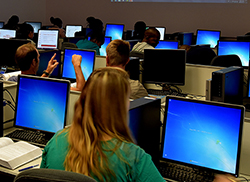Latest News Archive
Please select Category, Year, and then Month to display items
09 November 2018
|
Story Charlene Stanley
|
Photo Charlene Stanley
 Dr Tseliso Ntili, HOD of the Free State Department of Water and Sanitation, warns that pollution caused by mismanagement of municipal water-treatment works puts severe pressure on the province’s water security.
Dr Tseliso Ntili, HOD of the Free State Department of Water and Sanitation, warns that pollution caused by mismanagement of municipal water-treatment works puts severe pressure on the province’s water security.
“Despite our water challenges, Bloemfontein will never become a second Cape Town.” This firm assurance was given by Dr Tseliso Ntili, HOD of the Free State Department of Water and Sanitation, during his presentation at the recent regional seminar of the Faculty of Law’s Environmental Law Association.
The theme of the seminar was Water Quality and Water Security in Bloemfontein and was attended by staff and students from the Faculty of Law and the Faculty of Natural and Agricultural Sciences, as well as relevant role players from private, business, and government sectors.
Not enough water for city’s needs
Water restrictions in some form do seem to remain part of our future landscape though, as Dr Ntsili explained that the city’s current water yield of 218 megalitres per day still fell short of the demand of 259 megalitres per day.
Pollution and mismanagement at municipal level
He pointed out that a big cause for concern was that 75% of the Free State’s waste-water treatment works were dysfunctional. Housekeeping and security at these plants are often severely neglected. Yet, it is difficult for the Department of Water and Sanitation to act against offending municipalities.
“In intra-governmental disputes, the courts must be satisfied that organs of state have taken all reasonable steps to settle contentions – which can be a time-consuming process,” he explained.
Dr Ntsili said that the Caledon River System’s dwindling water levels due to low rainfall and siltation was also a concern, but that plans were underway to supplement the water supply to Bloemfontein via the Gariep Dam by 2026.
However, he warned that poor water management could drastically affect these long-term plans.
“If we can’t manage pollution, the cost will be high. Water security will be challenged, and we will have water shortages – not because of drought, but because of negligence.”
KovsieScholar to accelerate pace of scholarship and research
2015-09-02
 |
The University of the Free State signed the Berlin Declaration in 2011. Signatories of this declaration support knowledge dissemination within the open access paradigm. It calls for research output to be made available widely on the Internet, with permissions necessary for users to use and re-use research results in a way that accelerates the pace of scholarship and research.
On 24 August 2015, during Research Week, the Sasol Library launched KovsieScholar, the UFS’s new research repository that collects, preserves, and distributes open access digital material. KovsieScholar is an important tool for preserving our university’s legacy, facilitating digital preservation, and scholarly communication. KovsieScholar will increase the university’s global visibility as well as the impact and profiles of its researchers, and contribute to the preservation and sharing of knowledge.
The UFS has committed itself to supporting the principles of open access by encouraging its researchers to publish in open access journals, and by depositing peer-reviewed research papers in open access repositories.
For more information, contact the open access team at the Library: openaccess@ufs.ac.za